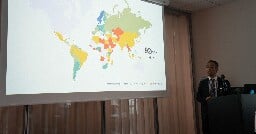Japan ranks 92nd in English proficiency, lowest ever: survey



mainichi.jp
Summary
Japan’s English proficiency ranking dropped to 92nd out of 116 countries, the lowest ever recorded.
The decline is attributed to stagnant English proficiency among young people, particularly due to the COVID-19 pandemic.
The Netherlands ranked first, followed by European countries, while the Philippines and Malaysia ranked 22nd and 26th, respectively.
tbf, the Japanese proficiency of English-speaking nations is probably lower.
It is a tricky language. Almost nothing in common with Indo-European languages except loan words. Completely different grammatical structure. Three different writing scripts.
At least the pronunciation isn't too bad coming from English as all the usual sounds are represented within our phonology. Compared to Spanish rolling R's, Russian and Arabic consonant clusters, Chinese tonality, and other difficult to pronounce languages.
Is what you'd think, but nope. Their r, sh, j, ch and w and u sounds are slightly different from English (enough so that some languages have the English version and the Japanese version as independent sounds), the lone n consonant has a pronunciation not existent in English, and Japanese has a tone system but it's simple enough a foreigner can get by without knowing it. That is to say, Japanese pronunciation is very different from English and decently hard to master, but if you just pronounce it like you would English (without stress of course, absolutely don't add stress) you shouldn't have a problem getting your point across.
Wait Arabic consonant clusters? If anything Arabic has less consonant clusters than English. As a native Arabic speaker what I would think is a problem for English natives is the consonants themselves, because we have a lot of them and many don't exist in English.
This was in line with my immediate thoughts too.
It seems grossly unfair to judge Japanese people on their ability to speak English.
That's a very idealistic position. English is either useful or necessary in many situations and fields, and having a population that doesn't know English can and will cause problems. How well people in a country speak English is an important metric for that country's development, otherwise nobody would care about it.
What are you on about? This is a survey of every country where English isn’t their primary language. This article is from Japan about Japanese proficiency in the English language.
It's still higher than the United States.
Funny. Joking aside, I don't think England, Ireland, the US, and Canada were tested.
Seems like my gut was right, that it's less because they're regressing, and more because other countries have been increasing theirs.
Here is the link to the report. It wasn’t in the article.
https://www.ef.com/wwen/epi/
I wonder what the methodology is. There’s no way Turkey is higher than Lebanon unless the metric is something specific that we have terrible data coverage for (which is very likely)
I also refuse to believe Hungary is in 17 when it feels like people here have a phobia of English (or a second language)
Isn't this in European terms? Europe as a whole is extremely good at English compared to the rest of the world.
Why so? Remember that Lebanon's preferred second language is French, not English.
I’ve been to both touristy and more “normal” parts of Turkey, and I was pretty shocked how few people understood English (or French, since you mention it). I actually mostly got by with a broken mix of English and Arabic loanwords I know they have in Turkey (or Turkish loanwords we have in Lebanese Arabic).
Drive down any road in Lebanon and you’ll see most signs, especially newer signs, are in English. When I was a kid it was mostly French and Arabic, now it’s mostly English and Arabic with some French sprinkled in. I’ve also been seeing a lot of municipal road and highway signs use “Beirut” instead of “Beyrouth”.
I think we still lean more heavily on French loanwords in our day to day Arabic, at least when not discussing something tech-related.
Also cinemas have consistently used the original English audio now, while we had a good 20% of these movies dubbed in French when I was a kid. A lot of companies’ business operations now are almost exclusively done in English (I’m talking about the documents - the conversations are naturally in Arabic).
I guess none of this is strictly true, there are areas and sectors (especially law) where French is still much more dominant. But people who are French-educated all eventually learn some English, the reverse (the category I’m in) is very rare. I still understand French, even rapid-fire French French, but speaking it or writing it has become so rare for me that it’s really atrophied over the past few years. My English is fine, because I’ve actually had to use it daily.
This is all just additional info, my point is just that Lebanon should probably be higher than Turkey on the list. Turkey has a massive domestic media machine, business is done in Turkish there, I’m pretty sure their schools teach everything in Turkish instead of having some subjects only done in foreign languages like we do. So just based on what I know in these two countries, the placements seem off, and it makes me question what else is going on with the data.